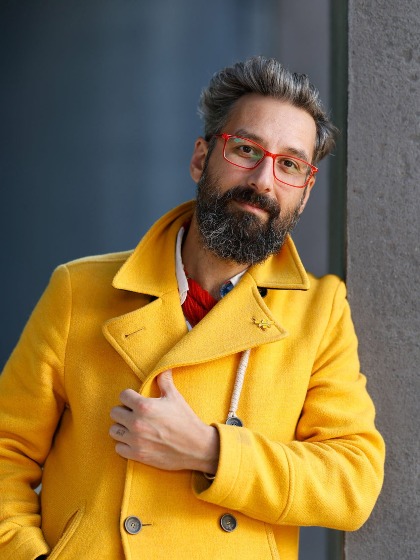A. (Tassos) Sarampalis, Dr

There are two major themes in the courses that I teach:
The first relates to my field of expertise, namely psychoacoustics, which is the scientific study of human sound perception. You can read more about the research that I do in this field (and why), in my Research Page. Wearing the psychoacoustician’s hat, I teach the following courses:
-
I teach first-year Psychology students about sound perception and the auditory scene in their Biopsychology course.
-
In the third-year elective course Sensation and Perception, I teach about auditory physiology, the perception and production of speech and music, and more general auditory perception matters.
-
In the Research Master of Behavioural and Cognitive Neurosciences, I teach the course Auditory and Visual Perception, where we deal with all matters of sound in great depth, starting with the physics of sound and auditory physiology, to basic mechanisms of pitch, loudness, and spatial perception, to tackling the problems of hearing impairment and speech perception.
The second theme in my teaching relates to research methodology, ethics, reproducibility, and adjacent topics, such as research integrity, open science, publication ethics, epistemology, science communication, and sundry. In this category, you’ll find me teaching the following courses:
-
In the course Research Instruments Critically Considered, which I teach in the Minor Psychology in Society, one can find a course that aims to help students be better-informed citizens and consumers of (psychological) science news in their daily lives. In a quick seven weeks, we cover basics of epistemology, Psychology’s scientific foundations, operationalisations of psychological constructs (and their pitfalls), research designs and their limitations, some basic statistical concepts, and spend a lot of time looking at examples and analysing them.
-
I don’t know how this ever happened, but my all-time favourite course to teach is Research Methods: Theory and Ethics. This is core course in the second-year of the Psychology Bachelor and builds on fundamentals covered in a first-year introductory course, while sitting alongside a practical course where students get hands-on experience conducting research (which I designed and used to coordinate). Throughout the course, we deal with evidence (what it is, how do we evaluate it); the various crises of confidence in the history of the social sciences (focusing on the most recent among them), their sources and solutions; replicability and reproducibility; preregistration; researcher degrees of freedom (my preferred way of thinking about p-hacking); science values, including the tension between openness and privacy; demand characteristics and experimenter bias; qualitative methodologies; epistemic justice; the concepts of causality, uncertainty, truth; and much else. I use my own version of Specifications Grading for stimulating engagement and offer much freedom so students feel empowered to choose their own path within this broad and important field.
There are a few courses that don’t fit this clear distinction of themes, but are no less important to me.
I’ve taught for many years in the Honours College at the University of Groningen and have enjoyed it tremendously. At present:
-
I supervise groups who conduct research in the second or third year of their bachelor.
-
I teach a project-based course on higher education values, principles, and methods in the final semester of the Bachelor Honours.
I organise the course Introduction to the Behavioural and Cognitive Neurosciences, for BCN Research Master and PhD students. I also teach science ethics and integrity to first-year students of the BCN Research Master and used to teach a course on science integrity to all PhD students of the Faculty of Behavioural and Social Sciences in Groningen (which was sadly ended when integrity training became centralised).
For more information on any of these courses, you can contact me by email.
| Last modified: | 02 September 2024 7.14 p.m. |
